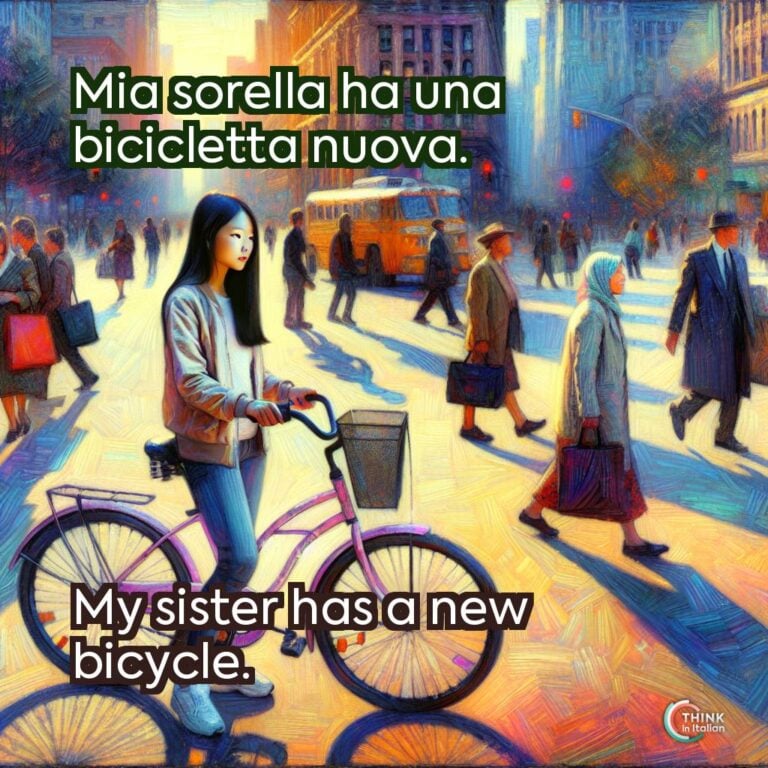Why is it so important the verb avere in Italian?
Avere translates to the obvious uses of ownership and possession for example, to have a sister or a cat, or a house, or a doubt, or a cold.
It can also translate in English to such things as to get, to have received a package, say, or news, and to hold a memory dear, for example.
In addition, it has a long list of daily uses beyond the obvious parallel ones in English: to be right or wrong, to be cold or scared.
It is also one of the two auxiliary verbs in Italian. The other being essere (to be).
This means that avere is also used to help conjugate transitive verbs (with a direct object) to form compound tenses.
Think of all verbs whose action has an object outside of the subject, like mangiare (to eat), baciare (to kiss), bere (to drink), vedere (to see), scrivere (to write), fare (to do), amare (to love).
However, transitive and intransitive verbs do not match exactly in English and Italian.
This makes avere one of the most important verbs in the Italian language and that’s why you should learn its conjugations in Italian.
How to conjugate avere?
Avere is not a regular verb in all tenses. Therefore, it does not have a fixed pattern nor does it have the same suffixes that are used for regular verbs.
Present tense
In English, you’re hungry. In Italian, you have hunger.
So, you need to learn the present tense of the verb avere (to have).
Here is the verb conjugation:
| Present Tense | |
| io | ho |
| tu | hai |
| lui/lei | ha |
| noi | abbiamo |
| voi | avete |
| loro | hanno |
Let’s look at some simple sentences with avere meaning to have in Italian:
Io ho un gatto.
I have a cat.
Tu hai un gatto.
You have a cat.
Lui / lei / Lei ha un gatto.
He/she has a cat.
Noi abbiamo un gatto.
We have a cat.
Voi avete un gatto.
You have a cat.
Loro hanno un gatto.
They have a cat.
In Italian, you can leave out the personal pronoun in front unless you want it for emphasis or clarity.
Past tense
The most used past tense in Italian grammar is the passato prossimo.
The present perfect tense of avere is formed by the present simple of it + its past participle: avuto.
In English it can be translated as had or have had.
| Past tense | |
| io | ho avuto |
| tu | hai avuto |
| lui/lei | ha avuto |
| noi | abbiamo avuto |
| voi | avete avuto |
| loro | hanno avuto |
Ho avuto una giornata lunga.
I had a long day.
Future tense
The conjugation of the Italian future tense (futuro semplice) of avere corresponds to the English will have or going to have.
| Future tense | |
| io | avrò |
| tu | avrai |
| lui/lei | avrà |
| noi | avremo |
| voi | avrete |
| loro | avranno |
Here are some examples of the future tense of avere:
Quando avrò la patente, potrò guidare
When I will have a driver’s license, I will be able to drive
Se l’esame andrà bene, entrerai all’università
If the exam goes well, you will enter university
What are the uses of avere?
There are many other instances where Italian speakers use have, instead of be. For example, you can also have thirst, sleepiness, hotness, and coldness.
Here are some more sentences:
Stefano ha sete.
Stefano is thirsty.
Abbiamo freddo.
We’re cold.
I bambini hanno sonno.
The children are sleepy.
Hai caldo.
You’re hot (not sexy).
Avere can also be used for expressing hunger:
| io | ho fame (I’m hungry) |
| tu | hai fame |
| lui/lei | ha fame |
| noi | abbiamo fame |
| voi | avete fame |
| loro | hanno fame |
How does avere is pronunced in Italian?
As you might have noticed, there is an H.
The reason is that this verb was spelled with an H in Latin (Habere) as it still is in English, have.
As Italian evolved, it lost the use of H for most words, and, as you know, now H is always silent.
The reason avere still has H in some of its forms is purely for disambiguation.
You see, in Italian, we have the following words:
- o (or)
- ai (to the)
- a (to)
- anno (year)
And it would be very unclear if these words also meant:
- I have
- You have
- He/she has
- They have
For this reason, we kept the H in those forms but you don’t need to remember this bit of information.
What you do have to remember is which forms of the present tense have the H and which ones don’t (noi and voi are the only forms without the H).
Avere: examples
In English, you have breakfast, a bath, a shower, a nap, a cigarette, a coffee, etc.
In Italian, you don’t use avere for those things. We use it mainly to refer to possession. Remember this when you speak Italian!
Let’s take a look at some more examples of how to use avere:
Io ho un gatto.
I have a cat.
Quante macchine hai?
How many cars do you have?
Non ho amici!
I have no friends! (literally: I don’t have friends!)
Avete informazioni?
Do you guys have any information?
Avere is also needed to talk about your age as in Italian, we are not an age but we have years of age.
Ho trentadue anni.
I’m 32.
Alberto ha venti anni.
Alberto is 20.
Quanti anni hai?
How old are you?
Other Italian verbs such as prendere (to take) or fare (to do, to make) have the meaning of to have in English:
Prendo una birra!
I’ll have a beer!
Faccio il bagno!
I’ll have a bath!
Facciamo colazione!
Let’s have breakfast!
Learn more about Italian verb conjugation here.




